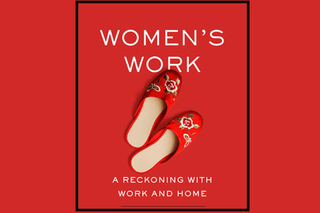
‘Women’s Work’ Spotlights the Domestic Help Who Make Working Motherhood Possible
“I never hear anybody point out the plainest truth that this model for women’s emancipation depends, itself, upon a permanent underclass of impoverished women.”

“I was in good company. The most brilliant and socially conscious female professionals I met around the world — the human rights workers, entrepreneurs, artists, journalists, diplomats, and wonks — enabled their careers by hiring impoverished women to care for their children. That was the underbelly. That was the trade-off. There was no other solution in sight.”
So starts Megan K. Stack’s, Women’s Work, a book about gaps — about the spaces in between that women fill and, almost inevitably, disappear into. About the gaps in time that women lose while doing so — and the accompanying, greater loss: of ideas, productivity, affection, trust, sanity. It’s about the vulnerability of bridging those gaps, and the privilege of ignoring them. The mind-twisting despair when you can’t manage either. And the most yawning gap of all — the male world’s silent, willful ignorance of all of it.
The first two-thirds of the book are a motherhood memoir, but one that contains more philosophical musings than most, moving the tome beyond awareness-raising and into the rarified circles of critique (or, as Stack herself might put it, one long “postmodern feminist breakdown”). This portion of the book chronicles Stack’s experience of early motherhood, andher decision to quit her career as a battle-hardened foreign correspondent for a prominent U.S. newspaper to focus on book writing and starting a family. It starts with the birth of her first son in China, and follows the family over the early years of his life in Beijing, their eventual move to India, where Stack’s husband takes a new job, the birth of Stack’s second son, and the early years of his life in New Delhi.
After so many pages, it verges on banal, quotidian — Stack’s struggles are not unlike the struggles of most privileged, high-achieving women: the sudden confrontation that biology will create gendered differences in experiences and roles where none existed before; the loss of intellectual stimulation and through it, one’s self; the explosion of the household, which before consisted of two fully capable adults, and now consists of a very vulnerable infant and caretaker(s) that require management. But that is, in part, Stack’s point; she offers very little in terms of the rewards or positives of motherhood, only occasionally referencing a raw, primal, ineffable kind of love that in the end makes her more vulnerable, more vicious, more a stranger to herself.
Related on The Swaddle:
Urban Women Spend 312 Minutes a Day in Unpaid Carework; Men Spend 29
What sets it apart, amid what could easily become trite reminiscences of difficulty, is the meditation on privilege that runs throughout these remembrances. Stack brings a foreigner’s curiosity and a journalist’s trained objectivity to a topic that she ultimately concludes is impossibly subjective: the relationships between household and household help, between her and her domestic workers, all of whom are women. “Domestic workers are usually depicted in one of a few ways: essential financial investments made by guilt-free families; scrappy naifs cruelly exploited by the heartless, clueless rich; or — more insidiously, I’ve come to think — ‘like family,'” Stack writes.
It’s a relationship most who have either grown up in the milieu, or have lived in it long enough, are primed to take advantage of — if not financially or physically, then at least in thought and in dependence. Even as she overlooks what she suspects is petty theft — a few yuan here, a few yuan there — Stack resents her nanny’s departure to care for her hospitalized daughter and inadvertently limits the woman’s time with her sick child, setting a deadline for the woman’s return. At one point, Stack meditates on a scenario in which she, her son, her husband, and her nanny are in a sinking boat; she must chuck one overboard to save the rest. In this mental exercise, she immediately sacrifices the love of her life and keeps the nanny.
Stack recognizes the economic advancement offered by domestic labor, but in the end concludes it’s a palliative argument: no other job pays a woman to lavish the care and affection she would otherwise give to her own child, her own household, on another’s. There’s a trade-off, and it’s usually borne by the domestic workers and by the children they must leave behind — certainly not by the woman who can afford to hire household help so she can maintain a semblance of career while ensuring her children are still well cared for. “I never hear anybody point out the plainest truth that this model for women’s emancipation depends, itself, upon a permanent underclass of impoverished women,” Stack writes.
The last third of the book is reserved for the women Stack lives with and writes about in the earlier chapters — her own employees — and this is, perhaps, the most interesting part (and the part that saves the book from white-savior territory). She goes back to the at-the-time pregnant helper the family left behind in Beijing, to the Delhi cook fired for alcoholism, and to her current and long-serving housekeeper in Delhi, to interview them and record their stories. For a few chapters, Stack becomes a minor player in the lives of women who are not expected to have stories — or whose stories no one wants to hear. Stack sees her ability to insert herself into their private lives at her convenience — or, more honestly, upon the inconvenience of her family — and their inability to disengage from hers. Their narratives paint a fuller portrait of Stack’s own experience of domesticity, as well as the women’s, filling in the gaps of Stack’s life, time, sanity and ability, the gaps in her earlier speculation. But then, these women have always filled the gaps. That’s what women’s work is: filling and disappearing, pregnancy and birth, building a home, a life, and withdrawing from the world in order to do so.
Women’s Work is a modern meditation on the privilege of being a wealthy mother in a developing country — regardless of whether you’re a foreigner or citizen — as well as the deep underprivilege of being a mother, a woman, anywhere, with any means. It’s about women’s work, but ultimately, it’s about men — who are notable in their absence from the book, the gaps they make in the home, in the lives of women, with their freedom to leave both behind. Much has been written about the employment gap in India, where fewer than 27% of women are part of the formal labor force — and where women, regardless of whether they’re formally employed, do twice as much caretaking work as men. “The cause [of gender inequity] was not, as I had been led to believe, that women had been prevented from working,” Stack writes. “Quite the opposite: we had been doing all of the work, around the clock, for centuries.”
Liesl Goecker is The Swaddle's managing editor.
Related


A Love Letter to Pre‑Loved, Budget‑Friendly Fashion
